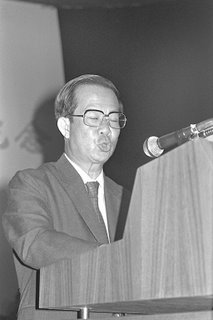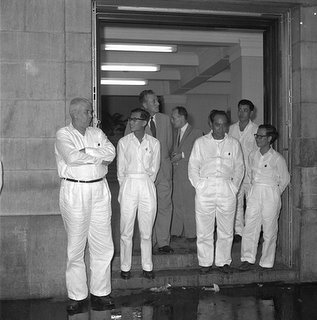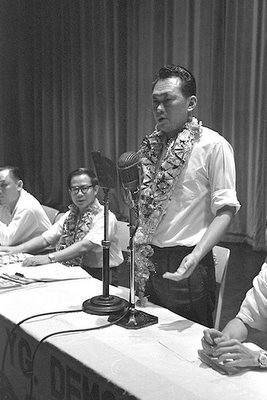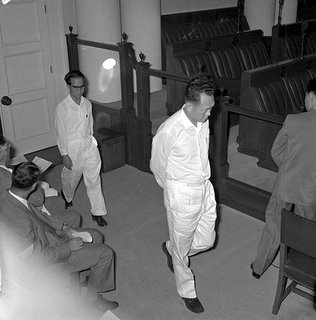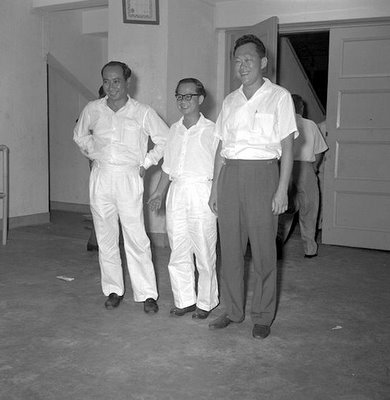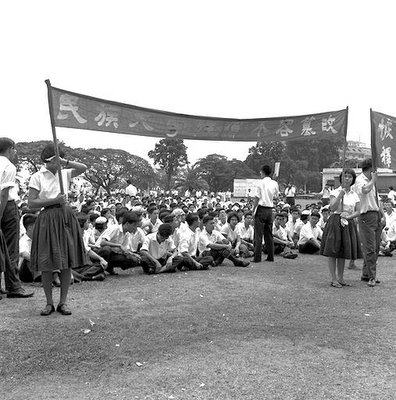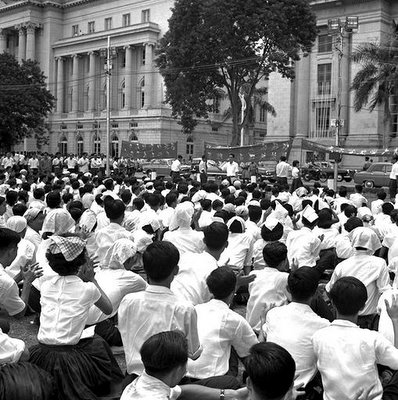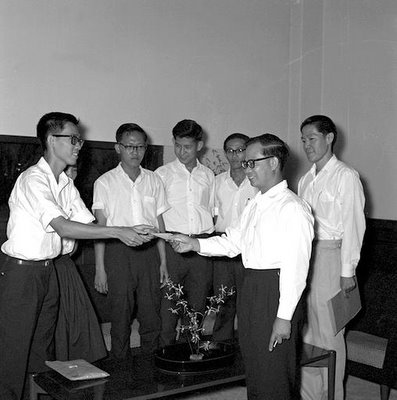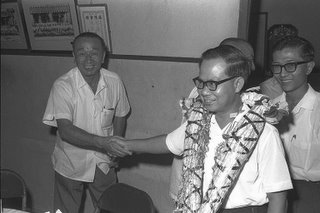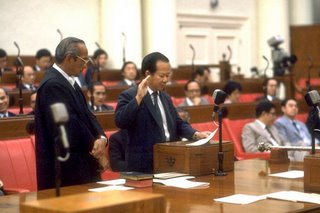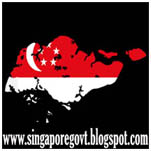Part III: Tribute to S. Rajaratnam
The Man Who Gave Singapore an Identity
I didn’t intent to write on S. Rajaratnam this early in the month. The original sequence was to write on the other Old Guards such as Dr Toh and Dr Goh before writing on Raja. However, I thought it is only appropriate that I write an article on Raja now, with his unfortunate passing on Thursday. The unprecedented scale of Raja’s State Funeral Service, is fitting for a man who gave Singapore an identity and a soul. Unlike many of the Old Guards who were born out of “Fire”, baptism of fire through the tumultuous years, Raja had the perfect elements of a Leader. He had the courage of steel, intellect of a sage, indomitable spirit of a lion, passion and energy of an unquenchable fire and more importantly, heart of gold.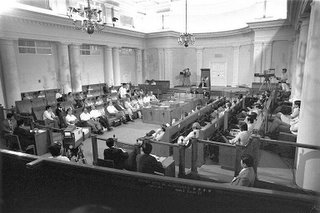 In the past week, tributes poured out from all walks of life to Raja and the papers have covered much of his accomplishments. The original article I planned to write on him prior to this passing, cannot never be as detailed or as eloquent as the papers. Nor would my article be as emotionally moving as the eulogies given by people dear to him at the funeral service. But in the course of reading the great achievements of Raja, words can’t really described such leader who practiced what he preached and what he believes in. Ultimately, he believed in treating all humans with intrinsic value and treating each human with respect, equality and love. His infectious smile, articulated use of words and genuine character and personality made him loved by both friends and former adversaries. If Singapore can be depicted as a human, Lee Kuan Yew gave it a heart and mind, Dr Toh Chin Chye gave it a skeleton, Dr Goh Keng Swee gave it flesh and blood, but Rajaratnam gave Singapore the most important element: a soul. Indeed, he brought soul into the society and the government. In every policy that Raja was involved in, the human element was put in first priority and central to it. When many politicians landed up serving power when entering politics, his brand of politics always served people; never to power, fame or glory but just people and Singaporeans.
In the past week, tributes poured out from all walks of life to Raja and the papers have covered much of his accomplishments. The original article I planned to write on him prior to this passing, cannot never be as detailed or as eloquent as the papers. Nor would my article be as emotionally moving as the eulogies given by people dear to him at the funeral service. But in the course of reading the great achievements of Raja, words can’t really described such leader who practiced what he preached and what he believes in. Ultimately, he believed in treating all humans with intrinsic value and treating each human with respect, equality and love. His infectious smile, articulated use of words and genuine character and personality made him loved by both friends and former adversaries. If Singapore can be depicted as a human, Lee Kuan Yew gave it a heart and mind, Dr Toh Chin Chye gave it a skeleton, Dr Goh Keng Swee gave it flesh and blood, but Rajaratnam gave Singapore the most important element: a soul. Indeed, he brought soul into the society and the government. In every policy that Raja was involved in, the human element was put in first priority and central to it. When many politicians landed up serving power when entering politics, his brand of politics always served people; never to power, fame or glory but just people and Singaporeans.
His contributions to ASEAN, foreign policies, domestic policies, culture and identity was well covered in the local papers. “The man who penned our pledge” and “the man who put Singapore in the world map” are apt titles for his achievements. But for many youths, they may never know or have the privilege meeting the real Rajaratnam. In the modern Singapore, many youngsters were guilty of forgetting our past and indulge in material wealth. History, is no doubt crucial, but is also and will be boring to many.
Once, someone asked me whether it will be a pity if youngsters do not understand our past. I said yes, indeed but it is not because we lack history books or educational materials of our political past. Ultimately, history itself is not “attractive”, “marketable”, “sensational” enough for the young ones to read it. History is and will be boring to most. Give them a choice of two books, Leaders of Singapore and DaVinci Code, which will they choose? I think the answer is obvious to most youth. The crux of the issue is that youths are not interested in political ownership and learning the history, more so when it is on Singapore. Simply because there are more entertaining and more fun things to do. I wouldn't say it is the PAP government’s fault for this sad societal problem but it is the mark of an economically successful country. We lacked ownership and patriotism not because there isn’t Singapore identity or that we don’t have a history. Raja and the Old Guards gave us one, just that we chose not to believe or we are blinded by the material aspect of the real world that we are Singapore Singaporeans. In this aspect, I think Raja epitomizes the term “Singapore Singaporean”.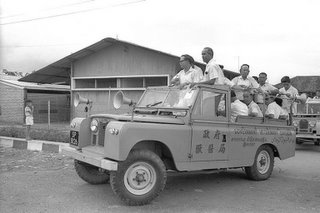
I was very lucky to be able to meet him once at an event couple of years back. Not many 25 year olds can be as blessed as me to get this chance. I didn’t know he was Rajaratnam, but only informed that he was one of the ex-MP. He was frail, old man who needed assistance to stand and walk. Later, I informed that during then, he was struck with dementia and possibly Alzheimer’s disease which robbed him of his precious memories. But the Raja that I met, was still the friendly, courteous gentleman that many personal friends who knew him as. Inherently, he was a wonderful and kind man. I was just an usher, a young man and a stranger. But he was still courteous and thanked me and my friends for every moment we assisted him.
This article will not list his every achievements or historical moments as I originally intended it to be. But instead, for those who didn’t have the privilege of meeting him in person, this article will just focus on some excerpts from the conversations with Rajaratnam published in Melanie Chew’s Leaders of Singapore.
QN: How did you meet Mr Lee Kuan Yew?
RAJA: I was working as a journalist. He organized the Postmen’s strike. He used the civil servants, the workers, to embarrass David Marshall. And of course that upset David Marshall no end.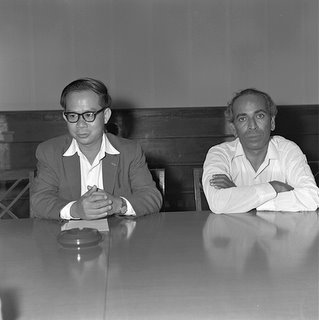 I didn’t know him then. I was editor and columnist for the Singapore Standard. It was a paper sponsored by Aw Boon Haw… (Raja spoke about the story of Aw Boon Haw and Lee Kong Chian)
I didn’t know him then. I was editor and columnist for the Singapore Standard. It was a paper sponsored by Aw Boon Haw… (Raja spoke about the story of Aw Boon Haw and Lee Kong Chian)
As that time, there was Lim Yew Hock and David Marshall. David Marshall was a one-man show. He was running the thing. We never agreed, we always were clashing with him. He disagreed with our approach to politics.
But he was a colourful figure. He was like another Messiah. He had a flat in North Bridge Road, where we first encountered him. You see, we were thinking of forming a party, but we had not yet declared ourselves PAP. So David Marshall said, “Come and join me.” He respected us, not Lim Yew Hock, Ong Eng Guan and so on. So he said, “You must come and join me. I’ll lead you!”
And so he gave us a dinner, one of the most lavish dinners. He was a very generous man. There were lots of goodies to eat. Very expensive red wines! We were eating and he tried to persuade us to join his party which was called the Labour Front. And we enjoyed ourselves, took advantage of his lavish dinner, very expensive dinner, and then we started explaining very bluntly why we couldn’t join the Labour Front.
Jokingly, we said, “Because Lee Kuan Yew is a lawyer and David Marshall is also a lawyer. But a different type of lawyer.” That irritated David Marshall, and he just said, “I don’t want to talk to you people, I’m going hone.” And he stepped out, got into his car and never turned back. And we looked at each other, Kuan Yew, and myself, and said, well, since the dinner is here, let us enjoy it! Red wine was there, and we got soaked!
QN: At that point you said there was no point to join the Labour Party, and you had to start your own. Why did you have this idea?
RAJA: Because we decided that we as Singaporeans must run Singapore, not anybody else. So we fought the imperialists, who ran Singapore as a colony. At that time we were thinking of running the whole of Malaya, Malaysia, and we brought together a very odd number of people: Mr Lee Kuan Yew, Kenny Byrne, myself, Goh Keng Swee, Toh Chin Chye, Ong Pan Boon, Yong Nyuk Lin, these are the first batch of the PAP.
QN: How would you characterize Lee Kuan Yew?
RAJA: Kuan Yew was really the leader. He’s the number one. So he was leading the group as a whole. Keng Swee was more of the civil servant, and I, the ideas man. And that’s how we all got started.
QN: Have you ever disagreed with Lee Kuan Yew?
RAJA: Yes.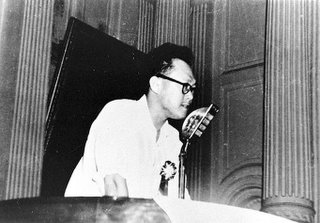
QN: Does everyone defer to him?
RAJA: They may defer to him, yes. But he knows at the same time that we are speaking openly. Even at the party conference, we speak openly. We are critical of him!
QN: And how does he react?
RAJA: He says, “Yes, you disagree with me. But nevertheless, I believe in what I believe.”
QN: Do you remember the start of the PAP in 1954?
RAJA: Yes! The first meeting was in Victoria Concert Hall. I was already in the Straits Times, on the editorial staff, so I could not get involved. The Straits Times was run by Englishmen, by a man called Simmons.
And there was a man called Samad who was a Malay, in Utusan Melayu. So he also a Leftist. He felt a bit uneasy that the Chinese-speaking were not included in the installation of PAP. So Samad Ismail said, “Look, I’m a Malay. But I am a Leftist, so I can join. But we need some Chinese speakers.” So we got Fong Swee Suan. He was a trade unionist. He was involved in bus strikes and so on. He was dialect speaking, Chinese speaking. Lim Chin Siong was not brought in because he was very Leftist.
QN: Did he feel that in order to win power, you had to attract the Chinese speaking masses?
RAJA: There was the belief. That was what Kuan Yew believed. He started studying his Mandarin! For he is a Baba Chinese, speaking only Malay and English. But when he went into politics he spent a lot of time learning Chinese. Ong Eng Guan was a very fluent, charismatic Hokkien speaker. Lee Kuan Yew didn’t know how to hit back. So he started studying Hokkien to hit back at Ong Eng Guan.
QN: It must have been very difficult for you as a Ceylonese Malayan. The masses in Singapore were Chinese. Did you worry about Singapore becoming a Chinese State?
RAJA: That’s why I believed in multi-racial democracy.
When you say the Chinese masses as a whole, well, they are not interested in politics. They are interested in making money. The pro-Communist Chinese were active because they had no share in the establishment. Some of them ended in jail. The chaps who were resentful of the PAP were the monied classes, the businessmen. They were frightened of the PAP! Some of them left Singapore in 1959, when we formed the government.
Some of the businessmen, you even hear of it happening now. When Keng Swee was here, the first thing he did was to build homes for the masses. Flats. No posh flats. High rise buildings. But the chaps who were making money were the bankers, businessmen. Even when I went there, they would greet me and give me garlands and so on, and then ask me for a piece of land. So Keng Swee turned it down. This land is valuable estate! And he started building high rise flats. So many Chinese, workers, shopkeepers, and so on, are all house owning, even my chauffeur. He has a flat. Everyone has a home.
QN: If we are to have a political theory to say that the strong man, the strong leader is the best form of government, then, it begs the question, how is this strong leader to be selected? And who is going to control him?
RAJA: There is a difference between me and Kuan Yew. He was not all that keen on democracy, “one man one vote.” I always believed that every one should be allowed to vote. This was an important difference. Goh Keng Swee had a different approach. He was a civil servant. We must have a very strong civil service. And we can dominate by running the civil service, and there is fair play all round.
I believe in democracy. Here, Kuan Yew and I don’t agree. He says, “You are very naïve. You don’t understand. One man, one vote won’t work.” Recently, he said there should be two votes for every educated man.
QN: This is quite a great difference. But you defer to him.
RAJA: I express my views. Every citizen has the right to vote. Lee Kuan Yew says that you cannot trust democracy. I believe you can and you must.
And Lee had this belief in IQ. Some are born with high IQ and some with low IQ. I remember once arguing with him. I said, “What is IQ based on?” I still have the book, Not In Your Genes. It makes this point: you can take the blood of any person, Chinese or Indian. Can the blood tell the IQ? No! It’s impossible. It’s not genetic.
QN: Can I ask you about Malaysia?
RAJA: 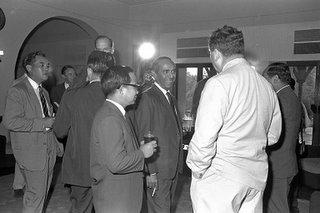
I was one of those who disagreed with Goh Keng Swee and Lee Kuan Yew. You see, we wanted a merger. At the time, Malaysia was formed. We wanted to form a common market. And one of the things we were very critical about, we didn’t want to have racial politics. In Malaysia, then was the Tengku, who was a very nice man. His politics were not that complicated. Taw Siew Sin was hostile to the idea, because he said that if the PAP gets into Malaysia, his own party the MCA will no longer be masters. But Tengku said, “Oh, let’s form,” so we had this referendum, and we won and merged with Sabah, Sarawak and the Federation of Malaya.
But as it went on, the Malays, Syed Albar and all those, were playing the Malay line, religion and so on, and there were two riots in Singapore in which chaps were slashed and killed. When these race riots started, we knew that if we carried on, Singapore is such a small island, and Communists were still active, very active. But we had riots, and Kuan Yew said, “OK, we’ll separate.”
QN: Whose idea was it to separate?
RAJA: Lee Kuan Yew and Goh Keng Swee had the idea. I disagreed. I was for merger. I said, “It doesn’t matter. Carry on.” That was where Kuan Yew and I disagreed.
QN: You wanted to try to resolve the disputes within Malaysia?
RAJA: Yes, because I believed in a multi-racial society. The Malaysians said, “get rid of the PAP.” And we separated. So we were on our own. Without resources. No Water. And Kuan Yew said. “This must work!” An independent Singapore. You must make it work. That was the reason why he was prepared to take some very tough measures.
QN: How did you feel at the time of separation?
RAJA: 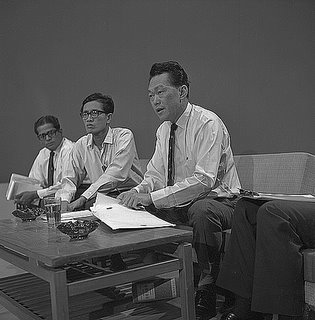
Separation, to me, was the crushing of my dreams. I believed in one nation, regardless of race and religion. My dreams were shattered.
That’s why Kuan Yew came, and he scolded me. He said, “You don’t understand. We are going to run this place.” You know? And Keng Swee too. He was also strong, determined. He said, “Let’s build flats!”
To me, it was also my family. They were from Malaysia. My brother, my father, were all from Malaysia. So to me it was separation from kith and kin. It has nothing to do with race. When I was still in the Malaysian parliament, I used to go to Seremban once in every two months. I would go there, and enjoy being with my family: my father, mother, nieces, nephews and so on.
QN: You didn’t feel that you should remain in Malaysia?
RAJA: No. I would be betraying something which I believed in. I believed in multi-racial democracy. And Singapore. I could have gone back to Seremban. But to me, politics is the essences of everything. It would have been betraying my political ideals.
QN: The Old Guards seem very close. Did you all work well together?
RAJA: Yes, we worked well together right up to the time when we were getting older, and it was said, “We wanted new blood.” So that was why we got Goh Chok Tong and people like that. They came in. They were not politicians at all. Goh Chok Tong was from Neptune Orient Lines.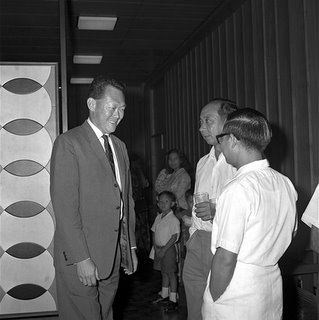
I had heart problems. So they had to do an operation. Lee Kuan Yew told me, “Raja, don’t strain yourself. I don’t mind you holding office, getting paid for it.” So I said, “OK, what do you want me to do?” Because I had already become Foreign Minister, traveling around, which I enjoyed very much. So he said, “Well, what do you want to call yourself?” I said, “Call me Senior Minister. Number One amongst equals.” So when he was Prime Minister, I was Senior Minister. And he followed me. So that’s how it started. We all step down in favour of others.
It also included Keng Swee. But he does not want to be subordinate. So he was in various posts, holding no office, in the Institute of East Asian Political Economy. Just like I was in Institute of Southeast Asian Studies. Both of us said we wanted to be on our own.
QN: How did you pick the second generation of leaders?
RAJA: We interviewed them. It took one whole year. We spent a whole year, drilling them, questioning them, making sure that they were not opportunists.
QN: What is Lee Kuan Yew’s vision?
RAJA: He believes that he must have a team of honest people. There were one or two cases where they were not honest, and we had to get rid of them, sack them. Lee Kuan Yew is not a tyrant in that he just enjoys pushing people around! He wants to select, train new people. He knows he cannot live forever. So we are getting Goh Chok Tong and others to come in, and we are training them.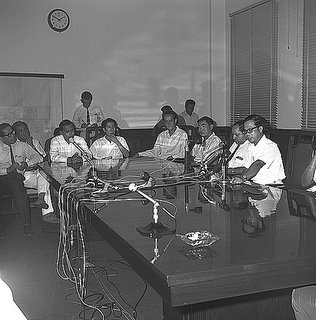
Chok Tong is an honest man. This is my assessment: “He is very sharp, a good listener, listens to the voice of the people. But he does not believe in the infallibility of the people. Unlike Lee, he smiles, even when he is angry. He has a good grasp of the problems facing Singapore. He does not believe in political dominance.”
Lee Kuan Yew is a dominant man. But Chok Tong believes in consensus. Once he’s decided, that’s it. There was little tiff between him and his son, you know. Because Lee Kuan Yew said, “If anyone stops my way, it doesn’t matter who he is, I’ll push him away.” For the first time the son was being different. And Lee Kuan Yew said, “No if anyone stands in my way I’ll just push through.” So while Lee Kuan Yew is alive, he’ll be dominant.
QN: What is his vision?
RAJA: HE knows that we can’t live forever. His dream is to leave behind a reputation. So that even when he passes away, that Singapore will remember him. That this is the man we wanted in Singapore. I don’t think that exactly what he wrote, but that is how he reflected himself, project himself.
QN: But it must be difficult for the second generation…
RAJA: Yes, I think so. Lee Kuan Yew doesn’t say it but I know. He thinks Goh Chok Tong should be trained – must be trained to be tough. Tough like Lee himself.
QN: Can one be trained to be tough? Or is it a natural trait?
RAJA: Well, he wants it. He knows that we are getting older and older, and must step down. Ong Pang Boon, Yong Nyuk Lin, Toh Chin Chye, they all stepped down. I stepped down, though I still associate with him. We may disagree. But we agree that if Goh Chok Tong doesn’t have the strong will like Kuan Yew had, he may have problems.
QN: When you observe our country, our people, is there anything which worries you?
RAJA: 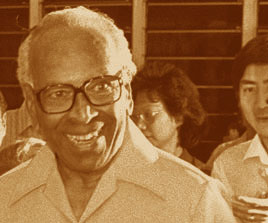 The big problem is that life is becoming comfortable for many Singaporeans. People are becoming used to comforts. They want cars. Many of them – Lee Boon Yang is mentioning this – want good things of life. Well I don’t blame them. This is part of what I said before, “moneytheism.” the worship of money. This will be one of the vulnerable points of the Singaporean.
The big problem is that life is becoming comfortable for many Singaporeans. People are becoming used to comforts. They want cars. Many of them – Lee Boon Yang is mentioning this – want good things of life. Well I don’t blame them. This is part of what I said before, “moneytheism.” the worship of money. This will be one of the vulnerable points of the Singaporean.
QN: How can we always afford to give people the best? And is it healthy for them to have the best?
RAJA: Yes, that is a contradiction in concepts. How can we give the best, the good things of life? How do you reconcile between giving people good things and yet making them undergo hardship as a price? I have not been able to find an answer for this yet.
QN: If you can’t reconcile this, maybe then Lee Kuan Yew is correct, that you can’t have democracy.
RAJA: 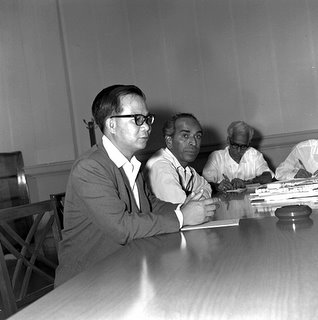 He may be correct. But intellectually and emotionally, I can’t accept it. But Kuan Yew is tough enough to say, “It will be that way. It must be that way.”
He may be correct. But intellectually and emotionally, I can’t accept it. But Kuan Yew is tough enough to say, “It will be that way. It must be that way.”
QN: That’s why you are the philosopher of the Old Guards?
RAJA: Lee Kuan Yew knows what I am talking about, but he doesn’t want to concede. He believes that if there are more Lee Kuan Yew’s, this place will hum.
QN: But it is difficult for others to be like him.
RAJA: That is the problem he has. That he has discussed with us, and as the result, he became Senior Minister. Not the Prime Minister. He wanted to test them, to make them go through this shock period. But not a shock where they become vulnerable. He’s like a father, trying to bring up his children, to make them strong.
QN: Do you think that the reason why all of your generation was so strong is because you had this struggle with the British, the Communists, and underwent hardship? And that is what made you Leaders. Whereas now, we don’t have any such…
RAJA: 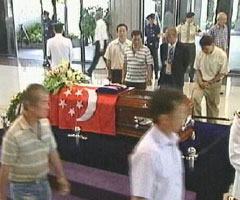 Yes, but you can’t repeat circumstances twice. You can’t. I studied in Catholic school, and got a distinction in Religious Knowledge. And I always mention this story about Moses. The chosen people were subject to the tyranny of the Egyptians. So Moses came and he said, “Israelites must be liberated.” And he took them and the first thing they did, they went into their desert, to have a golden calf, to celebrate their wealth. Moses said, “This is terrible.” And he made them wander through the desert for 10 years, made them go through the most difficult times! It was just next door! But he took them through the desert for 30 years, 40 years, to train them to be tough.
Yes, but you can’t repeat circumstances twice. You can’t. I studied in Catholic school, and got a distinction in Religious Knowledge. And I always mention this story about Moses. The chosen people were subject to the tyranny of the Egyptians. So Moses came and he said, “Israelites must be liberated.” And he took them and the first thing they did, they went into their desert, to have a golden calf, to celebrate their wealth. Moses said, “This is terrible.” And he made them wander through the desert for 10 years, made them go through the most difficult times! It was just next door! But he took them through the desert for 30 years, 40 years, to train them to be tough.
And that’s how the Israelites survived. Lee Kuan Yew wants Singaporeans to be tough. He also wants them to go through the desert. The hardship.
QN: But we live in a Garden of Eden
RAJA: That’s the problem.
Source: Melanie Chew’s Leaders of Singapore (1996). For the full text interview, please refer to the book which is available at the National Library and all major bookstore. Photos are from National Archive public domain. Not for reproduction.
Fittingly, and in memory of S. Rajaratnam, allow me to end with excerpts from MM Lee Kuan Yew’s Eulogy to Rajaratnam:
“With his passing, Singaporeans have lost a patriot, a man of deep conviction and principle. His contribution was not in bricks and mortar, or concrete and glass, but in ideas, sentiments and spirit. Everyday when the pledge is recited in our schools, our children are reminded to live up to our aspirations as Raja expressed them.”



